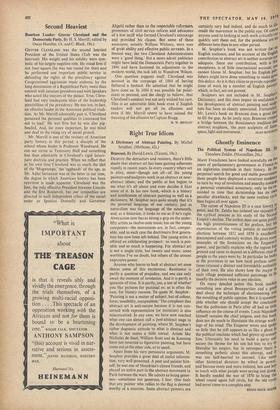Second Heaviest
Bourbon Leader: Grover Cleveland and the Democratic Party. By H. S. Merrill; edited by Oscar Handlin. (A. and C. Black, 18s.)
GROVER CLEVELAND was the second heaviest President of the United States (Taft was the heaviest). His weight and his solidity were sym- bolic of his largely negative role. He stood firm if not four-square (he was too round for that) and he performed one 'important public service in defending the rights of the presidency against Congressional 'aggression made endemic by the long domination of a Republican' Party more than content with fainéant presidents and with Speakers who acted like mayors of the palace, True, Cleve- ' land had very inadequate ideas of the leadership possibilities of the presidency. He was 'not, in fact, an effective leader,in the American political tradi- tion. As Mr. 'Merrill admirably puts it, 'Cleveland possessed the personal qualities to command but not to lead.' He was firm but he was also pig- headed. And, far more important, he was blind and deaf to the rising cry of social protest.
Mr. Merrill is one, of the revisers of ,American party history. in this period, a disciple of the school whose leader is Professor Woodward. He can see virtue in Tammany Hall and something less than admirable in Cleveland's rigid laisser- faire doctrine and practice. When we reflect that in his own time Cleveland was as much the idol of the `MugwurriPs,' the 'eggheads' of the age, as Mr. Adlai Stevenson was of the latter in our time, the degree to Which American history has been rewritten is made , apparent. Cleveland was the best, the only effective President between Lincoln and the first Roosevelt, but our sympathies are directed to such independent critics of the social order as Ignatius Donnelly and Governor Altgeld rather than to the respectable reformers, promoters of civil service reform and advocates of a low tariff who formed Cleveland's entourage and provided his claque. But some of these associates, notably William Whitney, were men of great ability and effective public servants. In a limited way, the two Cleveland Administrations were a 'good thing.' But a more adroit politician might have held the Democratic Party together in 1896 and have hastened its adjustment -to the modern world, the task left to Woodrow Wilson.
One question suggests itself. Cleveland was accused in the campaign of 1884 of having fathered a bastard. He admitted that he might have done so. In 1884 it was possible for politi- cians to pretend, and the der& to believe, that Cleveland's conduct was not only wicked but rare. This is an admirable little book even if English readers will not get all its allusions and even if Mr. Merrill seems to have missed the meaning of the allusion to Captain Bragg.
D. W. BROGAN


































 Previous page
Previous page